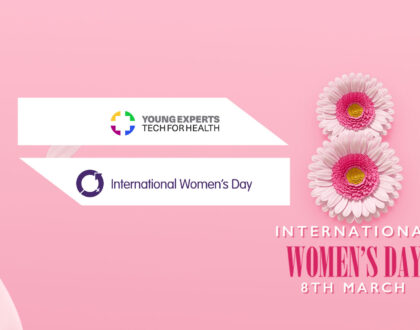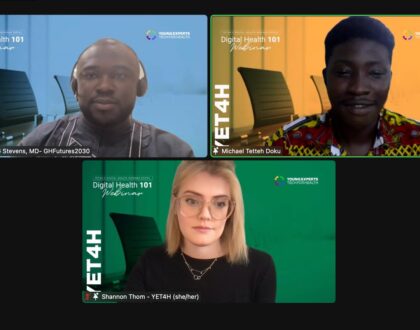Youth-Led Research: What is it and How it can harness Long-term Change

Youth participation is often looked as a “nice to have” in development project, when actually is the only path to long-term change.
In 2019, over 1500 young people globally voiced their concerns through a survey, “Health & Technology: What young people really think: calling for the integration of meaningful youth engagement into development strategies that affect the livelihood and wellbeing of young people. When policymakers initiate decision-making processes such as education, health, employment, and climate change, young people want to be consulted. Youth-led research stands out as a promising approach to supporting young people to be involved in various stages of decision-making processes. It positions the youth beyond the traditional “volunteer role” to become active contributors to policy, thereby meaningfully shaping their narrative. It follows the slogan “Nothing About Us Without Us!” with the ultimate goal of shifting power and knowledge generation to the youth.
What is Youth-Led Research?
Youth-led research is a youth engagement strategy mainly used by not-for-profit organisations to elevate youth voices when influencing policies.
This strategy is a programmatic approach that engages young people, typically 15-29 years old, in decision-making, teaching them leadership skills, and building relationships with community members. The aim is to train and mentor young people to collect evidence and document the needs, aspirations, and challenges of the youth. Youth-led research serves a purpose that traditional research can not; it does not serve advanced research needs such as baselines, in-depth assessments, or evaluations. Instead, the approach is based on listening, participatory action, and learning through interviews and data collection, where findings are used to influence policymakers and make recommendations for policy change.
How Youth-Led Research harnesses long-term change?
A Youth-led research initiative offers value in several ways. It has the potential to benefit youth researchers, communities, and youth projects.
1. Builds a strong foundation for youth leadership in advocacy
It changes the youth’s role in their communities by improving their access to community leaders. It empowers the youth with new skills and knowledge, enhancing relationships with elders and others, and creating opportunities for them to address problems and conflicts.
2. Knowledge generation and skill development
It produces new and useful knowledge that enables young people to understand community issues better and leads to more effective and relevant programming for youth issues.
3. Improve community relationships and problem solving
It is a flexible approach designed to achieve various outcomes such as challenging assumptions and misconceptions in the community to increasing interaction between youth groups and generating recommendations for community problems.
4. Inspires youth action
It provides young people with the opportunity to share research findings with the community and relevant decision-makers (local government, programs funders, etc.). This collaboration helps establish the youth researchers’ credibility in their communities and lays the foundation for continuous dialogue between decision-makers and young people.
Youth engagement and the 2030 Agenda for Sustainable Development
A 2018 World Youth Report revealed that the Sustainable Development Goals’ success hinges on meaningfully engaging young people in decision-making processes that impact their lives. Despite this revelation, Young people globally are not at the center of decision making even though almost half the world’s population is under 30 years old. The COVID-19 pandemic has unveiled the vulnerability of the youth who are at risk of being left behind in their education, health, wellbeing, and the inevitable rates of unemployment post-COVID-19. As governments and development agencies plan recovery efforts for the next decade, they must recognize young people’s role as a critical element.
We must recognize that youth participation is not only good practice but a necessity for sustainable development
These efforts include moving beyond the youth as purely health promoters to meaningfully engaging them in the youth-led research. This process aims to inform policy and other decision-making processes that affect their lives. We must recognize that youth participation is not only good practice but a necessity for sustainable development. Current approaches to developing evidence-based youth policies on health, education, and unemployment should be backed by youth-led research.
Restless Development is one of few organizations proactively enhancing youth research efforts to inform youth program design, influence development policy and practice, and broaden perspectives on young people’s role in local, national, regional, and international decision-making spaces. In 2018, one of their hallmark youth research initiatives, the Youth Power Accountability Advocates Ghana, was the United Nations Global Festival of Action winner. The project used a youth-research approach to gather reproductive health data from young people to influence the Ghana Adolescent Health Policy and Strategy. In 2019, Restless Development commissioned a Youth Think Tank project that used a youth-led research approach to generate evidence on livelihoods and employment. This project aimed to inform and influence decision making processes in six other countries in Sub-Saharan Africa (Kenya, Tanzania, Rwanda, Malawi, Zambia and Ghana).
Supporting youth researchers in all stages of the research cycle
While youth-led research maximizes young people’s leadership potential and prepares them as future experts, the ultimate measure of success hinges on how data collected is harnessed to impact policy. That is why young people need the support to ask the right questions relevant to their priorities, the tools to capture better data, and the ability to generate better insights that can inform various advocacy and decision-making processes.
Effective data collection
Between 2015 to 2018, three young Accountability Advocates from Ghana used data from eight regions to influence adolescent health policy to meet young people’s demographic needs. Their work reviewed existing gaps and generated new data on maternal health and sexual reproductive health and rights information and services. These young people were able to capture valuable data to elucidate the issues facing the community. In order to influence the decision-making processes, young people need to know the relevant and appropriate data to capture within a given timeframe. But to generate useful and reliable data, young people must be empowered with the requisite knowledge, skills, and research tools.
Generate better data insights
The effect of youth-led research is powerful when young people are supported to incorporate their different perspectives, lived experiences, and priorities on the issues that matter most to them. It is not enough for young people to gather their own data; they must be equipped with the skills and tools to analyze existing official data and make comparisons and inferences where necessary to generate their meaning into data collected.
Picking the right data collection tools
Secure and easy-to-use data collection platforms, like Teamscope, make it possible for youth activists to capture high-quality research data, even in settings with no internet connection. Furthermore, using real-time data visualization, researchers generate graphs that can be used in publications and presentations to provide insight and develop a better understanding. By using Teamscope, young researchers stand a chance to validate their findings from policymakers better. The application provides a step by step process leading to better documentation on how data is collected, stored, and analyzed. This ensures that collected data is processed transparently, accurately, and reliably, enabling high quality and useful data.
Influencing change through result dissemination
Lastly, networking, meaningful opportunities to participate, and platforms to share data are essential to youth-led research. Young people must be supported to participate in high-level decision-making spaces. By doing so, they can use their data to hold governments accountable and inform national and international debates. The successful case of the Accountability Advocates from Ghana shows a connection between data dissemination and policy influence. By sharing insights from research and their findings at regional, national, and international forums, the advocates gained attention from appropriate institutions and policymakers. Their participation at the 72nd United Nations General Assembly and presentations at the 7th African Conference on Sexual and Reproductive Health Right in 2018 paved the way for use of granular and context-specific data in policy review and integrated processes. Supporting young people to convene national stakeholder forums to connect, share data, and develop mutual partnership and joint commitment is an indispensable ingredient to the success of youth-led research.
Call to action
As echoed by the “Youth and the 2030 Agenda for Sustainable Development” report, young people’s engagement in sustainable development efforts is central to inclusive and stable societies. For young people to be active architects in the SDGs, their opinions and contributions must be valued in all implementations, follow-ups, and reviews. Taking action will mean supporting young people to generate their own evidence to inform decision making within their communities.
Research findings from young people can drive critical discussions with policymakers. Young people need to be given access and support with resources to amplify their voices and become thought leaders who can meaningfully inform and influence policy. Youth-led research, where successful, demonstrates how young people can lead and partner with others to monitor and implement the Sustainable Development Goals.
Recommended Posts

YET4H marks International Women’s day
March 29, 2023


